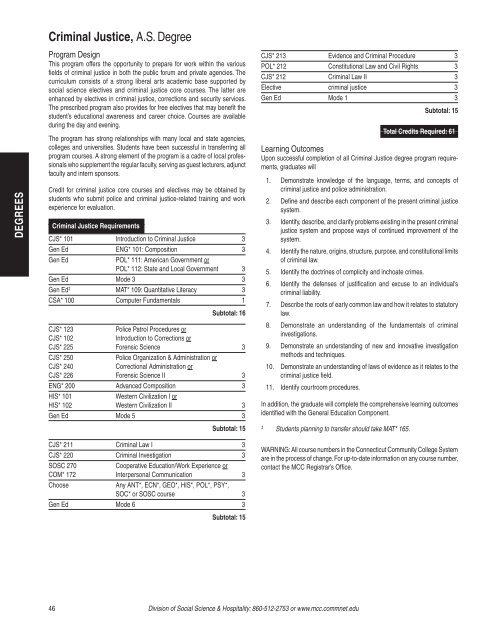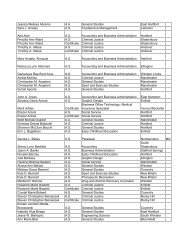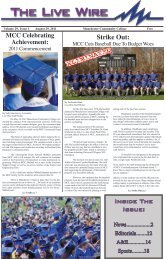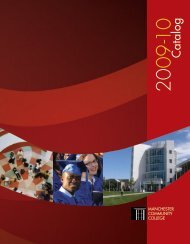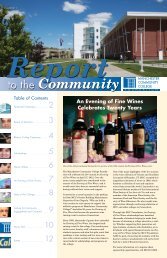Liberal Arts and Science - Manchester Community College ...
Liberal Arts and Science - Manchester Community College ...
Liberal Arts and Science - Manchester Community College ...
You also want an ePaper? Increase the reach of your titles
YUMPU automatically turns print PDFs into web optimized ePapers that Google loves.
DEGREES<br />
Criminal Justice, A.S. Degree<br />
Program Design<br />
This program offers the opportunity to prepare for work within the various<br />
fields of criminal justice in both the public forum <strong>and</strong> private agencies. The<br />
curriculum consists of a strong liberal arts academic base supported by<br />
social science electives <strong>and</strong> criminal justice core courses. The latter are<br />
enhanced by electives in criminal justice, corrections <strong>and</strong> security services.<br />
The prescribed program also provides for free electives that may benefit the<br />
student’s educational awareness <strong>and</strong> career choice. Courses are available<br />
during the day <strong>and</strong> evening.<br />
The program has strong relationships with many local <strong>and</strong> state agencies,<br />
colleges <strong>and</strong> universities. Students have been successful in transferring all<br />
program courses. A strong element of the program is a cadre of local professionals<br />
who supplement the regular faculty, serving as guest lecturers, adjunct<br />
faculty <strong>and</strong> intern sponsors.<br />
Credit for criminal justice core courses <strong>and</strong> electives may be obtained by<br />
students who submit police <strong>and</strong> criminal justice-related training <strong>and</strong> work<br />
experience for evaluation.<br />
46<br />
Criminal Justice Requirements<br />
CJS* 101 Introduction to Criminal Justice 3<br />
Gen Ed ENG* 101: Composition 3<br />
Gen Ed POL* 111: American Government or<br />
POL* 112: State <strong>and</strong> Local Government 3<br />
Gen Ed Mode 3 3<br />
Gen Ed ‡ MAT* 109: Quantitative Literacy 3<br />
CSA* 100 Computer Fundamentals 1<br />
Subtotal: 16<br />
CJS* 123 Police Patrol Procedures or<br />
CJS* 102 Introduction to Corrections or<br />
CJS* 225 Forensic <strong>Science</strong> 3<br />
CJS* 250 Police Organization & Administration or<br />
CJS* 240 Correctional Administration or<br />
CJS* 226 Forensic <strong>Science</strong> II 3<br />
ENG* 200 Advanced Composition 3<br />
HIS* 101 Western Civilization I or<br />
HIS* 102 Western Civilization II 3<br />
Gen Ed Mode 5 3<br />
Subtotal: 15<br />
CJS* 211 Criminal Law I 3<br />
CJS* 220 Criminal Investigation 3<br />
SOSC 270 Cooperative Education/Work Experience or<br />
COM* 172 Interpersonal Communication 3<br />
Choose Any ANT*, ECN*, GEO*, HIS*, POL*, PSY*,<br />
SOC* or SOSC course 3<br />
Gen Ed Mode 6 3<br />
Subtotal: 15<br />
CJS* 213 Evidence <strong>and</strong> Criminal Procedure 3<br />
POL* 212 Constitutional Law <strong>and</strong> Civil Rights 3<br />
CJS* 212 Criminal Law II 3<br />
Elective criminal justice 3<br />
Gen Ed Mode 1 3<br />
Subtotal: 15<br />
Total Credits Required: 61<br />
Learning Outcomes<br />
Upon successful completion of all Criminal Justice degree program requirements,<br />
graduates will<br />
1. Demonstrate knowledge of the language, terms, <strong>and</strong> concepts of<br />
criminal justice <strong>and</strong> police administration.<br />
2. Define <strong>and</strong> describe each component of the present criminal justice<br />
system.<br />
3. Identify, describe, <strong>and</strong> clarify problems existing in the present criminal<br />
justice system <strong>and</strong> propose ways of continued improvement of the<br />
system.<br />
4. Identify the nature, origins, structure, purpose, <strong>and</strong> constitutional limits<br />
of criminal law.<br />
5. Identify the doctrines of complicity <strong>and</strong> inchoate crimes.<br />
6. Identify the defenses of justification <strong>and</strong> excuse to an individual’s<br />
criminal liability.<br />
7. Describe the roots of early common law <strong>and</strong> how it relates to statutory<br />
law.<br />
8. Demonstrate an underst<strong>and</strong>ing of the fundamentals of criminal<br />
investigations.<br />
9. Demonstrate an underst<strong>and</strong>ing of new <strong>and</strong> innovative investigation<br />
methods <strong>and</strong> techniques.<br />
10. Demonstrate an underst<strong>and</strong>ing of laws of evidence as it relates to the<br />
criminal justice field.<br />
11. Identify courtroom procedures.<br />
In addition, the graduate will complete the comprehensive learning outcomes<br />
identified with the General Education Component.<br />
‡ Students planning to transfer should take MAT* 165.<br />
WARNING: All course numbers in the Connecticut <strong>Community</strong> <strong>College</strong> System<br />
are in the process of change. For up-to-date information on any course number,<br />
contact the MCC Registrar’s Office.<br />
Division of Social <strong>Science</strong> & Hospitality: 860-512-2753 or www.mcc.commnet.edu


